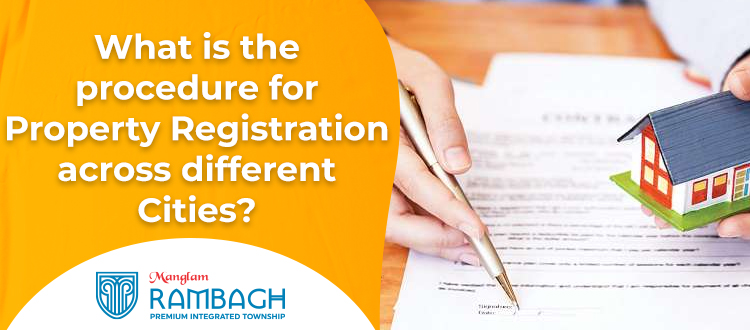Property registration is the most important and final stage of a home-buying process or a
property transfer. Once the property is registered in your name, it’s official: you own the
house! However, learning about property registration should not be put off until the last
minute. If you are looking to buy plots for sale in Neemrana or any other property, being
informed about the procedure will help you keep the necessary documents and budget
ready; you won’t be scrambling around for information or documents when it’s time. Read on
to understand property registration in detail.
What is property registration?
Registration of a property involves signing an agreement, between both buyer and seller of
the property. A property transaction is completed by registering the property under the new
owner’s name at the sub-registrar’s office. Upon registering, the buyer is the legal owner and
has full responsibility for the property. The buyer receives a sale deed after the property
registration is done. It acts as evidence of the sale and transfer of ownership from the seller
to the buyer.
Is property registration essential?
According to the provisions of the Registration Act (1908) and the Transfer of Property Act
(1982), the buyer is the legal owner only after registering the property with the concerned
authority. Property registration validates the sale and signifies the execution of a transaction,
making it a mandatory process.
Without obtaining the legal documents that announce the ownership of the property, the title
of ownership does not get transferred to the new owner; the previous owner still has legal
rights over the property. Tax benefits also cannot be claimed if the property is not registered.
Can a house be bought using the Power of Attorney?
When a homebuyer gives Power of Attorney (PoA) to someone, it means the buyer (grantor
or principal) has given the other person (agent) the authority to carry out legal and financial
transactions on his or her behalf. It is a common practice among sick people or non-resident
Indians (NRIs) who cannot be physically present for a property registration to purchase
houses by granting someone PoA. Out of the two types of PoA:
● General PoA – This legal document authorises an agent to perform or act on behalf
of the grantor. The agent has the authority to make legal, financial, and medical
decisions except decisions related to real estate.
● Specific PoA – This applies to property transactions. Unlike general PoA, specific
PoA as the name suggests is given to act on specific circumstances, such as buying
a house. The time frame and the limitations of authority are specified in the
document.
Can a property registration application be rejected?
Yes, a sub-registrar can reject an application on the following grounds:
● If the property purchased does not fall under the jurisdiction of the sub-registrar office
● If the details furnished contain any false information or information mismatch
● If the document presented is drafted in a language unknown to the registering officer
● If the document contains insertions, erasures, or alterations, it has to be attested with
the applicant’s initials or signature. Else, the sub-registrar may refuse to register the
property.
● In addition to this, all the parties involved in the transaction including the witnesses
should be present during registration.
When you decide to buy a property, it is important to abide by the laws governing it. The
rules are set to ensure that there are no fraudulent transactions. Hence, you must follow the
registration procedure of the respective state government when you purchase a property
for sale in Neemrana.



